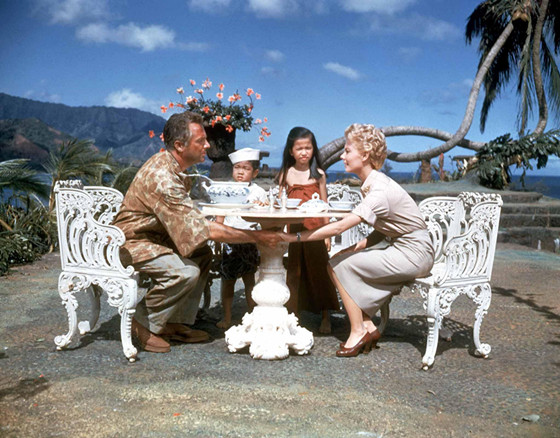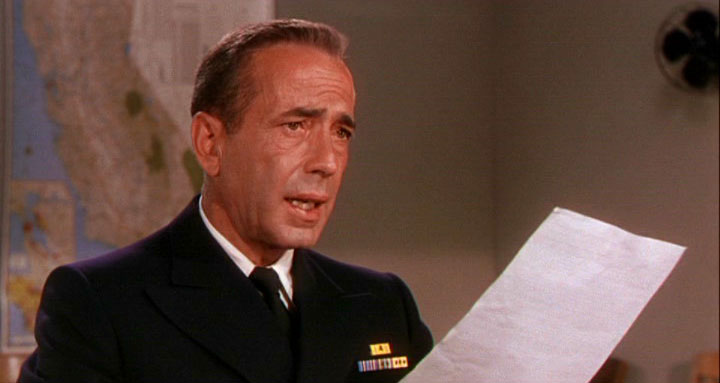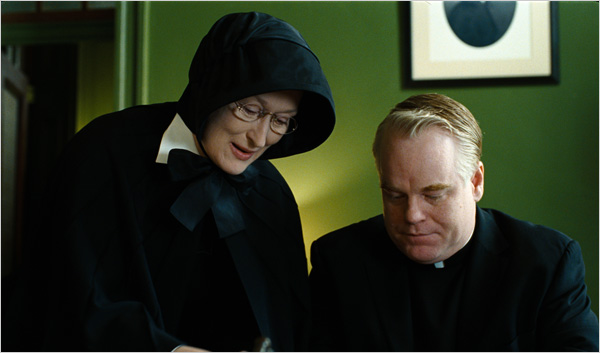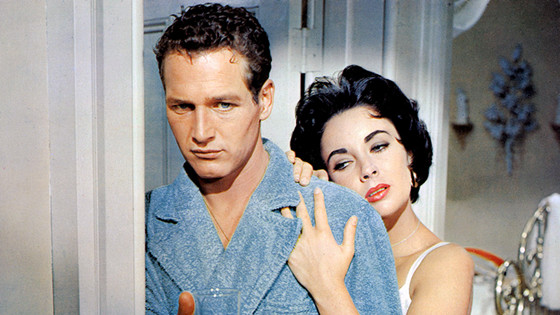8. All the King’s Men
Based on the Robert Penn Warren novel that has appeared on such lists as the greatest novels of the 20th century by Modern Library, and one of TIME magazine’s 100 best novels since 1923, the 1949 film version of All the King’s Men was quite successful in its adaptation.
The movie stars Broderick Crawford as the ambitious and sometimes ruthless politician Willie Stark, and John Ireland and Mercedes McCambridge, who both received Oscar nominations with McCambridge winning the category of Best Supporting Actress. The film endured a long production process with a running time of 250 minutes at one point.
The film’s editor and director were able to cut it down to 109 minutes, which gave the film a fast, loose pace. Broderick Crawford won the Best Actor Oscar for his performance and the film won Best Picture. It should be mentioned that the film deviates heavily from the novel source.
9. South Pacific
The only musical on this list, the Rodgers and Hammerstein classic South Pacific premiered on Broadway in 1949. The musical was an immediate hit, running for 1,925 performances. The Pulitzer Prize for Drama winner was itself based on a Pulitzer Prize for Fiction, the book Tales of the South Pacific.
The original Broadway production enjoyed immense critical and box-office success, it became the second-longest running Broadway musical to that point (behind Rodgers and Hammerstein’s earlier Oklahoma!), and has remained popular ever since. The production won 10 Tony Awards.
The film version, directed by Joshua Logan, starring Rossano Brazzi, Mitzi Gaynor, John Kerr and Ray Walston in the leading roles with Juanita Hall who had played in the original stage production. It was the top earners of 1958.
The soundtrack album stayed at #1 in the UK Albums Chart longer than any other album, for 115 weeks at the top in the late 1950s and early 1960s. It spent 70 consecutive weeks at the top of the chart and was #1 for the whole of 1959. The sound designer Fred Hynes won an Oscar for his sound work. South Pacific remains a musical classic.
10. The Caine Mutiny
The novel was based on authors Herman Wouk’s personal experience on a destroyer-minesweeper in the Pacific in World War II. It was on the top of the New York Best Seller’s List for over 60 weeks. It won the Pulitzer Prize for Fiction in 1951.
The film version, released in 1954, was directed by Edward Dmytryk and produced by Stanley Kramer. It starred Humphrey Bogart, Jose Ferrer, Van Johnson, and Fred MacMurray. The film depicts the events on a fictitious World War II U.S. Navy destroyer minesweeper and the subsequent court-martial of two officers.
There were not too many changes from the source material. The film was incredibly successful, being the second highest grossing film of 1954 and received seven Oscar nominations, including Picture, Best Actor for Bogart, and Best Dramatic Score by Max Steiner.
11. Doubt
Adapted from John Patrick Shanley’s Pulitzer Prize winning play Doubt: A Parable, Doubt follows a priest and two nuns in a Catholic Church in The Bronx. Father Flynn (Philip Seymour Hoffman), a well-liked and respected man gives a sermon about doubt. Sister Aloysius Beauvier (Meryl Streep), the strict principal of the parish school with the church observed shady behavior by Father Flynn and tells her fellow sisters to watch for him.
Sister James (Amy Adams), a young and naive sister, noticed the closeness between Father Flynn and Donald Miller, an altar boy and the school’s only black student. She later smells alcohol on Miller’s breath and reports her findings to Sister Aloysius. The behavior is construed in doubt, Sister Aloysius has no doubt that Father Flynn is a pedophile. Doubt is the surrounding cloud of the situation in both Shanley’s play and his filmic adaptation of the play.
Shanley wrote the screenplay and directed his own adaptation. The acting by Hoffman, Streep, Adams, and Viola Davis, who plays Donald Miller’s mother, was heavily praised and all of the actors were nominated for Academy Awards. Shanley was able to take the characterization and the dark mood of his play and translate it to the screen, he was awarded with an Academy Award nomination for his screenplay.
12. A Streetcar Named Desire
Tennessee Williams was awarded the Pulitzer Prize for Drama in 1948 for this masterwork of American theatrical prose. A few years later, in 1951, the director of the original play, Elia Kazan, and three members of the original cast, Marlon Brando, Kim Hunter, and Karl Malden, reprised their roles to bring the classic to the screen.
With a screenplay by Williams, under the direction of Kazan, and the addition of Hollywood heavyweight Vivien Leigh as Blanche Dubois, the film was a massive success. Leigh, Hunter, and Malden all won Academy Awards for their performances. The film made an estimated $4,250,000 at the US and Canadian box office in 1951, making it the fifth biggest hit of the year.
Although there were several changes made to the play, mostly to appease Hollywood censors, the subtext still remains. The performances of the cast and the direction of Kazan make those changes seem irrelevant and the movie stands on its own as an American classic. In 1999, A Streetcar Named Desire was selected for preservation in the United States National Film Registry by the Library of Congress as being “culturally, historically, or aesthetically significant”.
13. Cat on a Hot Tin Roof
A Tennessee Williams classic and his personal favorite, Cat on a Hot Tin Roof won the Pulitzer Prize for Drama in 1955 under interesting circumstances.
In that year, Joseph Pulitzer Jr. pressured the prize jury into presenting the Prize to Cat on a Hot Tin Roof, which the jury considered the weakest of the five shortlisted nominees (“amateurishly constructed… from the stylistic points of view annoyingly pretentious”), instead of Clifford Odets’ The Flowering Peach (their preferred choice) or The Bad Seed, their second choice. Williams ultimately received the prize so it is valid for this list.
The film version made in 1958 starred Elizabeth Taylor and Paul Newman as Maggie the “Cat” and Brick, the son and daughter-in-law of a wealthy cotton tycoon. It was one of the top grossing films of that year, with Taylor and Newman’s star power adding to the appeal. However, similarly to A Streetcar Named Desire several years prior, Williams had to make significant changes to the screenplay to appease Hollywood censors.
Williams was unhappy with the film adaptation which removed almost all of the homosexual themes and diminished the play’s themes of homophobia and sexism. Despite that, the film was still praised and was nominated for plenty of awards. I would suggest reading the play first or vice-versa, because there are major differences. However, the movie is still a good watch.
14. You Can’t Take it With You
Based on the comedic play in three acts by George S. Kaufman and Moss Hart, You Can’t Take it With You was the Academy Award winning film from 1938. Kaufman and Hart’s original play premiered on Broadway in 1936, playing 838 performances. In 1937, the play won the Pulitzer Prize for Drama.
The film version, directed by Frank Capra was the highest grossing picture of 1938, and was nominated for seven Oscars, winning two, Best Picture and Best Director. The masterful cast includes the likes of Jimmy Stewart, Jean Arthur, Lionel Barrymore and plenty of classic character actors.
The film follows a man from a family of rich snobs who becomes engaged to a woman from a good-natured but decidedly eccentric family. Although the screwball comedy style of the film has not aged as well as some of Capra’s more timeless classics, You Can’t Take it With You is still a farcical romp that doesn’t stray too far from the original play.
15. Glengarry Glen Ross
The play shows parts of two days in the lives of four desperate Chicago real estate agents who are prepared to engage in any number of unethical, illegal acts—from lies and flattery to bribery, threats, intimidation and burglary—to sell undesirable real estate to unwitting prospective buyers. Mamet’s play opened on Broadway in March of 1984 and closed on February 17, 1985. In 1984, the play won the Pulitzer Prize for Drama.
The film version features an all-star cast, which includes Jack Lemmon, Al Pacino, Kevin Spacey, and Alec Baldwin. The world-premiere was held at the Venice International Film Festival, where Lemmon took home the Volpi cup for Best Actor. Al Pacino was nominated for a Golden Globe and Academy Award for his performance.
Overall, Glengarry Glen Ross was a commercial failure at the box office, but the reviews were incredibly positive, praising all of the actors and the adaptation by Mamet. So, although it was not so financially successful, the film has had a lasting impact, and it gave us that great Alec Baldwin monologue.
Author Bio: Ryan Anderson is a sophomore at Miami University in Oxford Ohio, where he is studying Zoology and Women, Gender & Sexuality Studies. His love of classic cinema and film history keeps his love for film strong and ever-present in his life.







